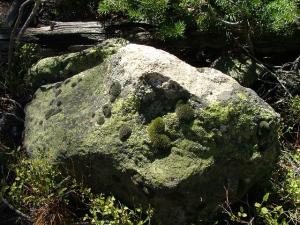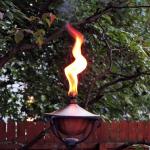
It’s odd, sometimes, how little things bring a series of memories back.
Rose wanted to hear stories of when I was a little girl, before she would go to sleep. I usually don’t know what to tell her. I want her to form her own conclusions, and not take my word for anything. I told something benign. “I had a boy cousin, a little older than me. We used to play together, when we traveled to West Virginia for reunions. There were big rocks outside the cabins at the State Park, and we’d jump on them. We pretended they were mountains.”
They did seem like mountains, once upon a time. They’d be impressive even now, I suppose; smooth-sided shelves of mottled gray limestone the size of a Galapagos tortoise. There was a time when I was too little to climb on top of them, and then, the next year, I wasn’t anymore. That was the year my cousin jumped from rock to rock reciting all the words from “Hop on Pop.” I was too small to jump so deftly, so I mostly hopped on the ground. My cousin claimed he’d written that odd poem himself, and I believed him.
The year after that, I could read, and I wasn’t so easily fooled.
One year, we put on a pageant: I was the princess and he was the prince. We pretended one of the rocks was his horse. Another of those rocks was a throne for his brother, who played the king. Our other cousin hid behind a third rock to be the wicked witch who tried to capture us with “strings” as we walked by. She was supposed to shoot magic snares from her fingers, a bit like Spider-Man, but we couldn’t rig up that special effect, so she just gestured at us. Eventually she brought out her dragon– the youngest of my brothers at the time– and the prince killed it with a plastic sword.
I’m sure I’m mixing up the timeline somewhat, but that play must have taken place a year or two after “Hop on Pop.” I know it was after we learned to read, because my cousin wrote out a draft of the script for me in his neatest printing. He said the play had to be called “The Dungeon,” even though there wasn’t a dungeon in it. It was a nice, foreboding word, difficult to read and fun to say. “The Dungeon.” Someday I will write a serious story called “The Dungeon,” but I don’t know what it will be about. Surely not a witch who shoots string from her fingers.
One year, there was a nest of bees or hornets burrowed at the base of one of the rocks– I didn’t get close enough to see which they were. Our parents told us to stay away, but of course my bad cousins all gathered round to taunt them. My older cousin poured a glass of iced tea over the nest and they all ran away. Later they threw a dead frog they found in the creek into the middle of the swarm; then they dared each other to reach in and grab it back. I honestly don’t know if they didn’t get stung or they just didn’t mind.
Then came the year we didn’t play together at all. He had decided he was too old to play with girls. I played with my female cousins, or sometimes by myself. I would sit very close to the rock and make believe it really was a mountain. The tufts of moss on the sides were groves of hardy pine trees just below the timber line; the lichen was a meadow of papery white grass. Most people lived in the grass forest at the foot of the stone mountains, but some rustic folk built cabins in the shadows of the moss trees, and pastured their goats on the lichen. A few of those mountaineers had never been down at sea level, where the soil was rich and the grass trees provided abundant food. The people on the mountain were coarse, weather-beaten, unpleasant-looking men and women who didn’t stand on ceremony. They’d likely be in conflict with the gentler people in the grass forest, if there was an easy way up and down. But to get up and down, one had to rappel on the cliffside, and neither group wanted to try that often, so the mountain people kept to themselves.
It wasn’t long before I abandoned the game. It was too hard to imagine people smaller than ants eking out a living on no soil at all, just solid slabs of limestone, even if they did have lichen for the goats. I had never seen a mountain that was higher than the Timber Line; I knew about the Appalachians, and that was all. Trying to picture the Alps or the Andes made me dizzy.
A year after that, my cousin had turned downright nasty. He still didn’t want to play, but there was something more; something mirthfully cruel in his demeanor. My brother informed me that he was making fun of my new adolescent weight gain every time I walked out of earshot.
I never trusted him again.
I suppose many girls have had that eerie experience of returning to the same location year after year, and each time finding the rocks a little smaller. Many more have had the experience of coming back, feeling themselves the same person, and finding they are wrong. They grew into women. They aren’t beautiful anymore, if they ever were, and old playmates are no longer kind.
I haven’t seen my bad cousins or any part of that park since I cut ties with my mother all those years ago.
Maybe I’ll never see them again.
But my daughter didn’t need to hear all of this.
“You pretended they were mountains?” she asked, incredulous.
“Yes,” I said. “Mountains. And once we put on a play, and I was the princess. And I pretended that the moss on the rocks was a forest of trees, and–”
Rose quickly grew impatient. “I don’t want to hear about things I don’t know,” she said. “Tell me stories of when I was a baby.”
We both liked those much better.
(image via Pixabay)













